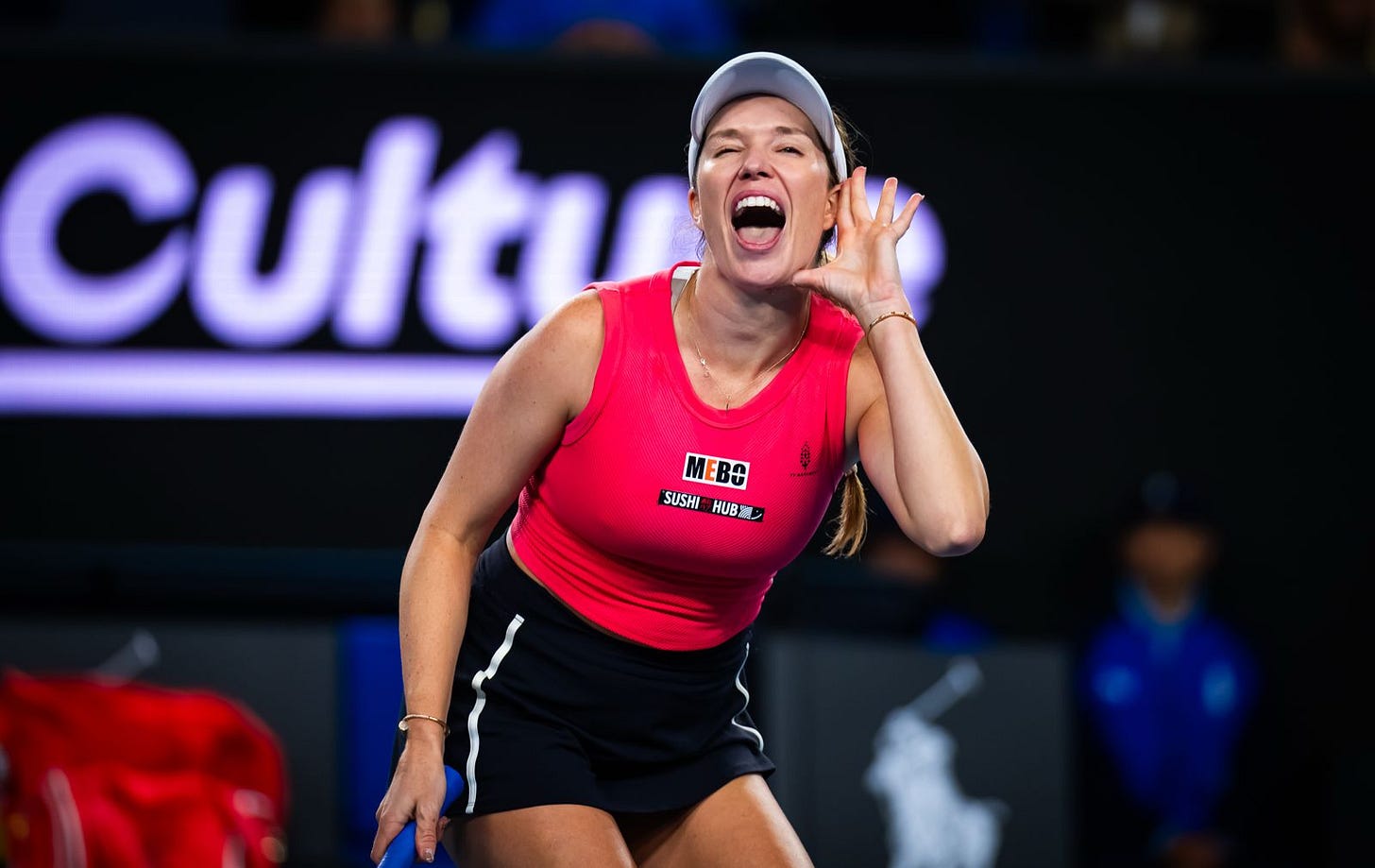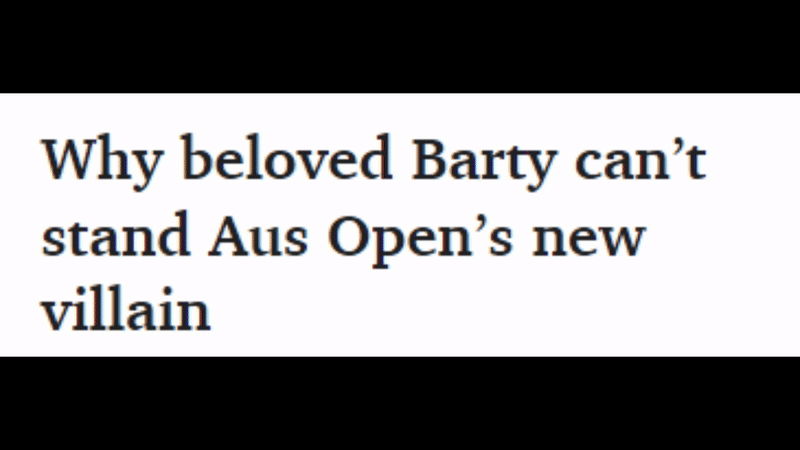Collins Causes All This Conversation
Anointed antagonist of this Australian Open, Danielle Collins says the best revenge is her paper.
MELBOURNE, Australia — As I mentioned in my first post from here, the Australian Open media center was reconfigured considerably for this year’s tournament.
So though I know a lot of the general layout of the place, when I was invited to do a radio appearance for 3AW’s Wide World of Sports on Friday evening—to talk about Danielle Collins and some other American-centric storylines in the tournament—I headed over to the part of the building housing 3AW’s on-site studio with time to spare, just to make sure I didn’t get lost en route and wind up being late for my segment.
I wound up getting there in plenty of time, early enough to hear the entire segment before mine: an interview with Australia’s best WTA player of the early 2000s, Alicia Molik.
Knowing what the topic for my planned appearance was, I was surprised when the majority of Molik’s segment (starting about 1:50 into the audio embed below) was on the same subject as mine: Danielle Collins.
After the third question she got from host Bruce Eva about Collins, Molik acknowledged how predominant of a character—an antagonist, to be more specific—Collins had become.
“Yeah, it’s been a bit of a wild ride, the last 24 hours,” Molik said. “I’ve never seen a player really stick it to the crowd like she did. I mean, it got headlines, and it’s well-documented exactly what she did and what she said.”
What All the Fuss Is About
“Well-documented” was a typically Aussie understatement by Molik: Collins has been the talk of this tennis town ever since winning match point against Destanee Aiava on Thursday evening, and taunting the partisan crowd in Kia Arena with blown kisses.
The booing resumed as Collins began her on-court interview. Sensing an opportunity, Collins laughed and took the microphone—and control—into her own hand.
“I was thinking during the match: Hmm, if I’m out here I might as well just take that big, fat paycheck,” Collins said, her words pouring accelerant onto the boos. “CoCo [Vandeweghe] and I, we love—we loooooove—a good five-star vacation. So part of that check is going to go towards that. So thank you guys! Thank you for coming out here and supporting us tonight.”
My first thought upon seeing Collins’ moment was that it was a real shame was that Daniil Medvedev, who gave the trolliest on-court interview of the previous decade after a win at the 2019 U.S. Open, was on court at the same time so he couldn’t enjoy another installment of the genre.
And after suffering a crushing defeat to losing to Learner Tien at nearly 3 a.m., Medvedev likely wasn’t in any mood to enjoy the footage, either. Minutes after it was announced at 3:32 a.m. that Medvedev was on his way to the main interview room, the handful of us who had hung around were told Medvedev wouldn’t be coming at all. (Tien made it in a few minutes later, carrying a pizza.)
But Tien’s victory pepperoni wasn’t nearly as tasty for the Australian media as the spicy red meat Collins had served up at the podium four hours earlier, doubling down on her on-court comments.
“One of the greatest things about being a professional athlete is the people that don't like you and the people that hate you, they actually pay your bills,” Collins said. “It's kind of a cool concept. Obviously my professional career is not going to last forever. So I just remind myself every day when I have that kind of stuff: they're paying my bills. Every person that's bought a ticket to come out here and heckle me or do what they do, it's all going towards the Danielle Collins Fund. Yeah, bring it on. I love it.”
Collins then bragged about her life of luxury in a way few of the millionaires on tour ever allow themselves to do publicly.
“Me and my group of girlfriends love a five-star vacation,” Collins said. “I can guarantee you that check is going to go towards our next five-star trip, hopefully to The Bahamas. We like big boats, we like yachts. We'll post about it, let you guys know how it goes.”
How the Tour Sees Collins
Collins isn’t universally popular on tour, to be sure. In her 2022 memoir My Dream Time, Ash Barty revealed that she didn’t want that year’s Australian Open final—which she knew could be the last match of her career—to come against Collins.
“Who I'll be playing against is decided the next day. Iga Swiatek is playing Danielle Collins, and for me the equation is simple. I love Iga, and I have a rocky relationship with Danielle. I want to play Iga. I want to share it with her. But Danielle wins, and I think back to the matches we've had in the past and how they were never fun. I never walk off court after playing Danielle thinking, That was good tennis. Each match has been an ugly, tiring scrap.”
No other player got singled out for distaste like that in the rest of the book. Barty, who consistently presented herself with an archetypally Australian antipathy for ostentatiousness, made sense as a Collins detractor.
But Collins is considerably more complicated than that, and means different things to different people. Though she’s been called a “villain” here, Collins is actually at this tournament, she said in her pretournament press conference, because the tennis tour is where she’s made friends, and where her friends are still going to be there for her as she struggles with setbacks in her fertility journey.
“I have been doing this for seven, eight years,” Collins said of traveling the tennis circuit. “My closest friendships are a lot of the women on tour, a lot of the people on tour. You think about that lifestyle change when you're going through something that's so challenging emotionally, and then to not have that support system, that's... Yeah, it's a lot. So I'm glad that I can keep doing this for a little bit longer and have that [support].”
Women’s tennis is so often described as being cold and catty, so Collins acknowledging how much she relied on her fellow players for social support was striking. Really, I thought Collins’ honesty, vulnerability, and humanity were hugely striking in that opening press conference, which you can watch in its entirety here.
After that press conference, Collins spent several minutes in the hallway giving a reporter1 thorough suggestions of some of her favorite vacation spots in Australia.
One of the players whom Collins has been closest with is Jessica Pegula, who emphasized how normal her dealings with Collins are.
”She's always been super nice to me, and I was just talking to her a lot today about a bunch of random different things: her renovating her house and doing all this stuff—she's always been great,” Pegula said.
“So on court she kind of has this little persona that she likes to do. I mean, yeah, I don't know how to explain it other than, like, she's just going to be herself. I think you have to kind of respect that at the end of the day and appreciate that—especially for a woman's sport. I think it's kind of refreshing to have that.”
Coco Gauff, who got to know Collins better recently during United Cup earlier this month, told me that she was surprised to learn how open Collins was.
“I think she’s a nice person,” Gauff said. “I always say Danielle is going to be Danielle. There's no one changing her. She doesn't care either. That's something I can respect when someone knows who they are.”
When I asked Gauff what “Danielle being Danielle” meant, Gauff said it was self-explanatory.
“Just being her—like, authentically being herself,” Gauff said. “I mean, if you know Danielle Collins, you know exactly what I'm talking about. Yeah, being authentically Danielle. I have no other way to phrase it. But if you know her, you know.”
Pegula had seen Gauff’s answer by the time I asked her about Collins, and endorsed it.
“I think Coco said it best: Danielle is going to be Danielle,” Pegula said. “I think that's the perfect way to put it. I appreciate that she's honest and she is who she is. I think it's honestly great for the sport to have that entertainment and to see her personality. Something different. Tennis can be kind of stuffy, and so I think to have that mentality that she has, she said it. She's like, it doesn't matter if it's a good crowd or a bad crowd; she's going to feed off of it and try to use that to motivate her.
“Not everybody can do that; not everybody likes to do that,” Pegula added. “Not everyone is good at it. If you are and you are out there and you are trying to win and that's what helps you win, like, you're going to do that. Obviously my personality is much different, but I can respect and appreciate that she doesn't really care.”
Novak Djokovic’s Zeal for the Collins Topic
Asking fellow Americans about Collins was fairly obvious. But after seeing his joy at sparring with the crowd during and after his easier-than-expected win over Tomas Machac on Friday night, I decided to use the one question I’d get in his press conference to ask Novak Djokovic to add his thoughts to the Collins conversation.
Djokovic, more than I could've imagined, was thrilled at the opportunity.
“I loved her response,” Djokovic began. “I loved, loved it. Everything she said on the court, off the court. Big fan of Danielle Collins after that. I was before, but now, big fan. I love it.”
I asked Djokovic if it should “be more appreciated that if you’re getting it, you can give it back.”
“I heard some comments of people that she shouldn't have said that or that; I think she handled it really well,” Djokovic said. “I don't think I would be that polite—and I know exactly the feeling. So I think she was funny, smart, and just—big fan of what she did. Big fan.”
When I followed up again by asking “if tennis could be less precious or serious about these sorts of things,” Djokovic’s next answer went on a long journey I never could have seen coming, lasting nearly four minutes and over 500 words. Even for Djokovic, who loves long answers as much as he loves long rallies, this was a ride:
“I don't know. Yes and no, I guess. We have the history and tradition that we are proud of and makes our sport different from other sports. But at the same time, you know, I think we have been a little bit behind the other sports with changes and trying to keep the pace with the evolution of society and the new generation that we all know doesn't have that much of a great attention span, and they want the movement.
So, for example, [in] the last couple of years I think only, that we have this new rule where people are able to come in even if it's not a changeover. So I guess that's one of the ways to really try to open up a bit more and not have strict rules.
It's not easy for players, I guess. I mean, from my side, not easy to go from one end to another extreme and just let everybody say whatever they want to say—talk, scream during the point.
So I feel, with tennis, it takes a little bit more time. But with NextGen Finals, which is a concept that I think is very positive for our sport, and I had my differences with Chris Kermode, our former [ATP] president, but with NextGen Finals, I think it was a brilliant idea to test, you know, certain changes that we might want to implement on the tour level—the highest tour level.
I don't know if they still have it: They had these headphones, coaching, and then everyone watching in TV can hear what the player and coach are talking about. Fast4 sets, no-ad, no let. Maybe not everything is ready to be implemented on the highest level, but I think there are certain changes that are worthy of considering.
So yeah, I think that we should try to look to connect more with the younger people and bring them. And I want to see a little bit more entertainment. For example, why wouldn't we consider doing something between the sets like the Super Bowl or, I don't know, the NBA, right? When there is a timeout, they have, you know, dancers come in and this and that. I wouldn't have problem with that. Nice dancers, you know, there for a few minutes more break so I can relax my nerves and think about something else.
I just feel like it would bring a more fun element and entertainment to the tennis that we know has been quite traditional and maybe conservative in some things.
When we talk about ‘conservative,’ we know Wimbledon is the most conservative. But, for example, with Wimbledon, I wouldn't change much and I would keep it as it is, because it's so unique—all-white and strawberries and cream—and everything about it is just so elegant and classy.
But all the others, U.S. Open—I mean, in USA, you guys know very well what entertainment is about. So I'm up for it.
Just like maybe gradual changes. Dancers first.
There are no dancers below the paywall here today, but I do have picks for Day 7 at the Australian Open, and a clip of my own radio segment to share.






